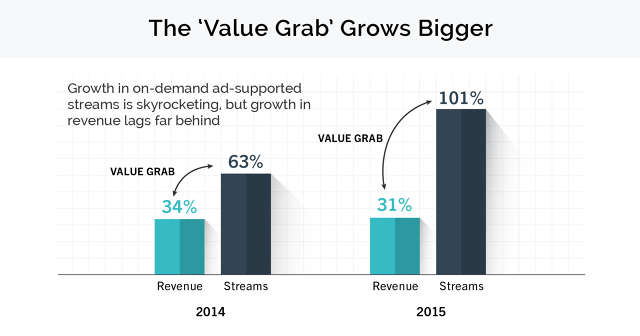This Chart Explains Why Music Services Want You To Pay Up More
Over the course of the next year or two, expect your favorite free music apps to start hitting you up for cash more often. YouTube may show more ads urging you to sign up for its YouTube Red service. Services like SoundCloud and Vevo will add their own subscription tiers. Pandora is reinventing itself as an on-demand service. Spotify might even start hiding new albums behind a paywall (although the company denies this).
However it all unfolds, the pressure is ramping up for music services to move away from being free. Why? Ad-supported streaming music simply doesn’t generate as much money as other formats like paid subscriptions or even vinyl (yes, vinyl), according to the latest music industry report from the RIAA. This disparity between paid and free streaming revenue has been known for awhile, but the latest figures drive home the point even harder. Just look at this chart from the RIAA’s new report:

Ad-supported streaming grew more than 100% last year, but the revenue from all that listening grew a mere 31% (three points fewer than last year).
Part of this gap (which the RIAA has branded a “value grab” by streaming services) is due to the fact that a certain amount of content on user-generated sites like YouTube and SoundCloud is not, historically speaking, legal. That’s been changing as YouTube has cracked down on copyright infringement over the years and SoundCloud has buttoned up its deals with labels (With Sony now signed on, all three major labels are covered, and a SoundCloud subscription service could be imminent). Even without piracy, the economics are clear: Getting tens of millions of people to pay $10 per month (or $15 for Apple Music’s family plan) is more lucrative than showing a Geico ad before the new Katy Perry video on YouTube (et cetera).
This is why YouTube launched Red last year and why just about every other ad-supported music streaming service is busy getting ready to launch a paid subscription service of some kind.
Of course, this is not to suggest that free music services are going to start shutting down and trying to force everyone to pay up. The music industry already knows from past experience how that would play out (and even limiting major releases to specific paid services can backfire, as Kanye West recently learned) but if the recording industry has its way, music services are going to start trying to nudge more people toward the paywalls they’re building (or have already built).
Fast Company , Read Full Story
(22)














